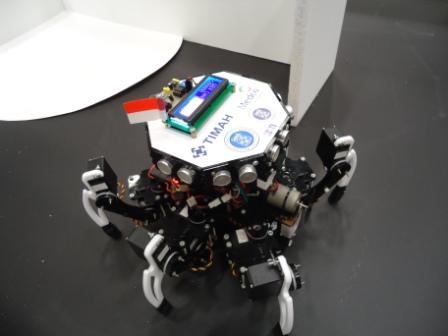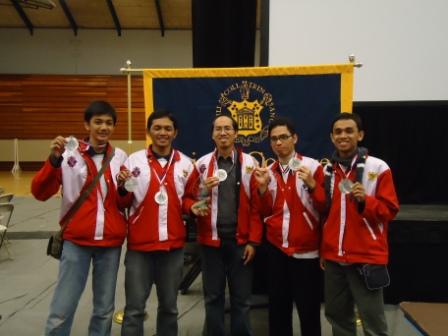ITB's Robot 47 Times Faster than the World's Best Robot
By Fathir Ramadhan
Editor Fathir Ramadhan

 CONNECTICUT, itb.ac.id - In the recent 18th Trinity College Fire Fighting Home Robot Contest 2011 held in Hartford, Connecticut, team ITB successfully snatched first and second place in the smart two-legged robots category. ITB sent two teams to the contest; Yaqut ITB finished the given mission in 34 seconds, while Zarqun ITB finished at 39 seconds. The closest competitor from Portugal finished the mission in 1600 seconds, 47 times longer than the time it takes for ITB's robots.
CONNECTICUT, itb.ac.id - In the recent 18th Trinity College Fire Fighting Home Robot Contest 2011 held in Hartford, Connecticut, team ITB successfully snatched first and second place in the smart two-legged robots category. ITB sent two teams to the contest; Yaqut ITB finished the given mission in 34 seconds, while Zarqun ITB finished at 39 seconds. The closest competitor from Portugal finished the mission in 1600 seconds, 47 times longer than the time it takes for ITB's robots.
The Trinity College Contest is the oldest robot contest in the world, and thus commonly referred as the most prestigious mechatronics competition available. In this particular contest, robots are graded based on the time it takes for them to douse fire in a given labyrinth.
Finished All Mission Challenges
 As explained by Dody Suhendra (Electrical Engineering '05), the teams' manager, contestants are given a set of challenges for them to choose from. The ITB teams chose all of the available challenges and overcame them. In this contest, the robots are placed in a labyrinth with various routes, entrances, and heat sources. The robots would have to detect the fire inside that labyrinth and douse it. Every robot is given a distinctively different labyrinth.
As explained by Dody Suhendra (Electrical Engineering '05), the teams' manager, contestants are given a set of challenges for them to choose from. The ITB teams chose all of the available challenges and overcame them. In this contest, the robots are placed in a labyrinth with various routes, entrances, and heat sources. The robots would have to detect the fire inside that labyrinth and douse it. Every robot is given a distinctively different labyrinth.
What sets ITB's robots apart from the others is their capability to finish the job regardless of the start point it was given. Other robots can only work if placed in a certain start point. Also, ITB's robots can detect the fire after only half of the robots' body entered the room. Other robots require their whole bodies to be inside the room to determine whether there's fire in it.
Dody said that initially the teams weren't too confident as they were up against strong opponents. These challenges include the Portuguese team that includes masters students, the Chinese team which was known for their previous achievements, the Israeli team which has won some known competitions before, and even a team from the prestigious Massachussets Institute of Technology (MIT).
Even so, ITB's robots were superior in terms of mechanical design, research (the research done for this particular competition has been done for 2 years), along with program efficiency and effectivity.
Success Despite Financial Obstacles
Dody explained that some obstacles like the availability of tools, components, and rooms have to be faced by the team prior to the competition. Many of the required tools and components weren't available in ITB's labs or in Indonesia, and therefore have to be bought from overseas with expensive cost.
The ideal room size required to prepare the robots is 15 x 15 meters, but such free room was unavailable in the campus.
To be able to achieve such a prestigious title amidst the seemingly low odds is something to be applauded of.

.jpg)
.jpg)
.jpg)
.jpg)
.jpg)

